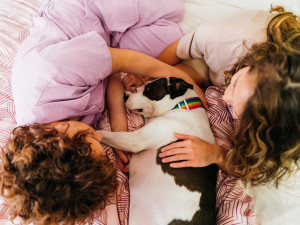Paging Dr. Doggo
Your pup may know you’re sick before you do, a study says.

share article
You’re lying on the couch under your heaviest blanket. Your energy is low. You feel a little...off. Your pup snuggles up to you like they know something is wrong. Then, the following day, you wake up with the flu.
If it ever seems that your dog has the uncanny ability to tell when you’re sickopens in a new tab, it’s not all in your (stuffed-up) head. From reading body language to actually sniffing out disease, dogs have several ways they can pick up on illnesses. We did a little digging, including checking in with Dr. Glen Golden — a research scientist at Colorado State University’s Department of Biomedical Science — to find out just how far a dog’s detection skills go.
Let’s start with a dog’s most impressive tool: their nose. A dog’s sense of smellopens in a new tab is between 10,000 and 100,000 times better than a person’s. That’s a lot. But what does a keen sense of smell have to do with telling when someone is sick?
“Since Hippocrates, it has long been speculated that diseases might be diagnosed based on odor,” says Dr. Golden. “Over the last decade, studies have shown that the volatile organic compounds (VOCs) found in urine, feces, breath, or other bodily emanations have been successfully used to detect disease or infection. This has led researchers to conclude that VOCs found in waste are a window into the body.”
Dogs Are Skilled Sniffers
Dogs can learn to detect various diseasesopens in a new tab, including diabetes and breast cancer, by sniffing urine, sweat, and breath. And some researchers are currently training dogs to detect COVID-19. In fact, a recent studyopens in a new tab found that trained dogs are better at detecting COVID than rapid antigen tests. A dog can be a reliable way to sniff out (literally) certain illnesses. But sometimes, dogs pick up on conditions or medical events for reasons that are less clear.”
Dr. Golden explains: “We know dogs can respond to an oncoming epilepsy opens in a new tabevent or a PTSD fugue state. But what, exactly, they are responding to isn’t definitively known. There is some evidence to suggest that, in the case of epilepsy, dogs are responding to a certain odor. However, it hasn’t been proven that odor is the only thing driving the response. With PTSD, there’s strong anecdotal evidence that dogs are responding to a variety of stimuli, including human micro-expressions and body language.”
This means dogs’ ability to detect illness goes beyond their sense of smell. Since the average dog hasn’t been trained to alert people to the presence of diseases, the reason your dog seems to know when you’re sick probably has little to do with odor — and a lot to do with their relationship to you.
But They Shouldn’t Replace Medical Providers
Your dog knows you — your body language, your behaviors, and your routines. They’re also very good at reading moods and picking up on changes to the norm. Take facial expressions, for example. Dogs can recognizeopens in a new tab when you’re mad, relaxed, happy, or down. And researchopens in a new tab has also shown that they can pick up on (and respond to) emotional cues by listening to changes in a person’s voice. So, if something is a little off with you, chances are your dog will know it.
At this point, you may be wondering, if dogs are so great at identifying when someone isn't well, will they ever play an everyday role in human healthcare? According to Dr. Golden, we shouldn’t hold our breath for the day dogs show up in exam rooms as part of, say, a routine dermatology screening.
“Dogs have been shown to use their noses to reliably detect melanoma, but that doesn’t mean our canine friends are likely to be used in place of lab tests,” Golden says. Instead, researchers are working to better understand how a dog’s (or other mammal’s) nose can be so much more sensitive than current medical testing.”
OK.
So, dogs won’t be used in the average doctor’s office. But what if you could train your own dog to pick up on certain conditions and use them as a warning system for oncoming illnesses? With patience and proper training techniques, this might be possible. But just because a pet parent can potentially train their dog to alert them to certain stimuli doesn’t mean they should. Dr. Golden warns that “training a dog to alert you to an oncoming migraine, for example, could result in complacency over a dangerous situation, or cause you to ignore other symptoms that would be best detected by a medical doctor.”
In other words, people with medical degrees are still important; your primary care physician should not be your dog. But that doesn’t mean we can’t appreciate the extra attention our furry friends give us when we’re under the weather. They still make the best — and cuddliest — nurses around.

Kate Sheofsky
Kate Sheofsky hails from San Francisco, where she developed a love of writing, Giants baseball, and houses she can’t afford. She currently lives in Portland, OR, and works as a freelance writer and content strategist. When not typing away on her laptop, she enjoys tooling around the city with her two rescue pups searching for tasty food and sunny patios.
Related articles
![Woman laying on tan couch beneath large windows showing trees and sunshine with her dog laying beneath her]() opens in a new tab
opens in a new tabHow Alison Wu’s Dog Is a Positive Force for Her Mental Health
The lifestyle blogger and creative director’s Spaniel helps her stay grounded:
“When life gets inevitably turbulent, Tilly offers me much-needed stability, support, and calm.”![Gemma Correll smiling and holding up her one-eyed Pug dog against a red backdrop]() opens in a new tab
opens in a new tabGemma Correll Talks Pug Life and Mental Health
How the illustrator’s rescue dogs improve her psychological well-being. (Spoiler: Pugs make pretty great weighted blankets.)
![Minna Lee smiling at the camera while holding her dog, Benny the Corgi, who is dressed in a Sherlock Holmes Halloween costume]() opens in a new tab
opens in a new tab5 Ways Minna Lee and Her Corgi Prioritize Their Collective Mental Health
The wellness entrepreneur on living with and learning from her anxious dog, from taking breaks to setting boundaries.
- opens in a new tab
Does Your Dog Have Therapy Dog Potential?
Renowned animal behaviorist Patricia McConnell, PhD, on what it takes to be a great therapy dog.






